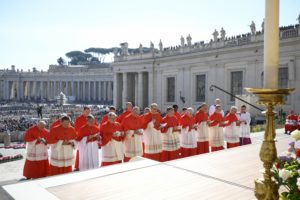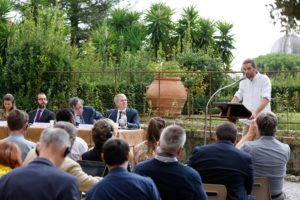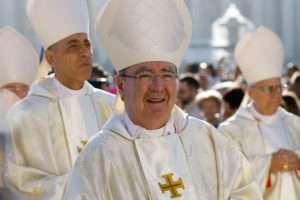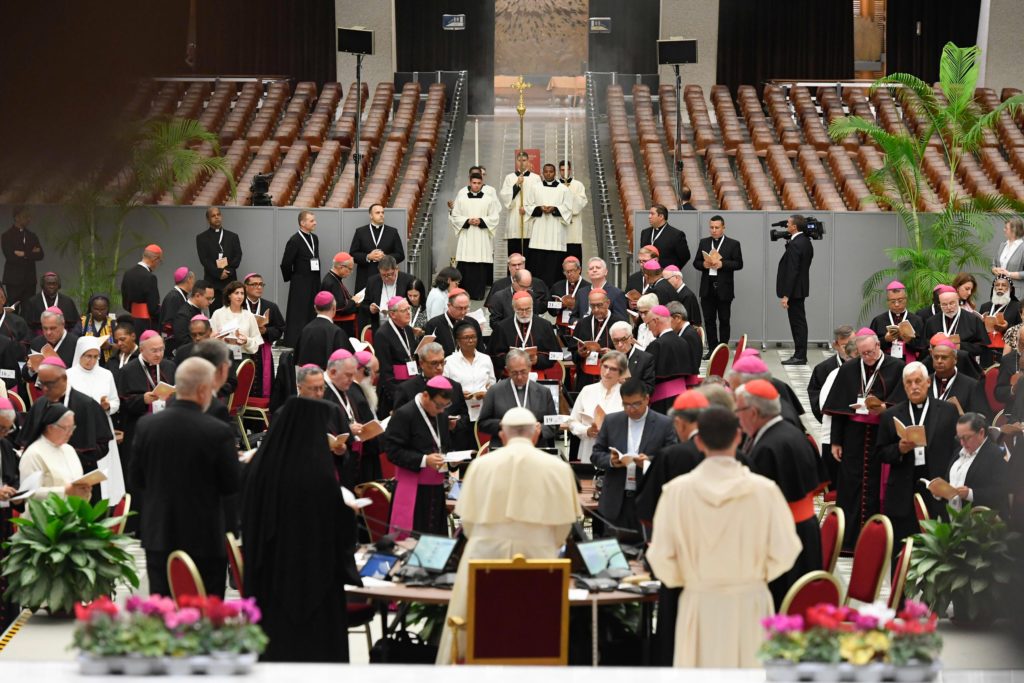ROME — Even by the feverish standards of the Pope Francis era, the period between Sept. 30, when the pontiff created 21 new cardinals, and Oct. 7, when the dust settled on the opening act of his keenly anticipated Synod of Bishops, likely will be remembered as among the most raucous and riveting weeks of his papacy.
Consider what we’ve witnessed over those seven days.
- A consistory in which 21 new “Princes of the Church” received their red hats, including 18 under 80 and therefore eligible to elect the next pope, which not only reshaped the electoral math of the next conclave, but also gave us several new plausible contenders for the top job.
- A spiritual retreat ahead of the Oct. 4-29 Synod of Bishops on Synodality in which participants were urged to seek a Church no longer perceived as “exclusive” and “marginalizing,” including in its outreach to women, gay people, and the divorced and remarried.
- Release of a set of “dubia,” or critical questions, about the synod submitted to Pope Francis by five conservative cardinals, including American Cardinal Raymond Burke, pressing the pontiff on matters such as doctrinal change, the blessing of same-sex unions, the teaching authority of a synod, women’s ordination, and the necessity of repentance for the forgiveness of sins.
- Publication of Francis’ responses — in itself a novelty, since he never responded the last time cardinals submitted “dubia” — in which he gave a cautious approval of blessing same-sex unions on a case-by-case basis, and a basic (though nuanced) no to women’s ordination.
- Ongoing controversy over secrecy requirements for the synod, with spokespersons struggling to explain the pope’s logic for barring participants from discussing their own contributions or those of others, while at the same time conceding there won’t be any punishment for people who go public anyway.
- Release on Oct. 4 of Francis’ new apostolic exhortation “Laudate Deum” (“Praise God”), calling for urgent action to combat climate change, in which Francis strongly rejects skepticism on global warming and also blames developed nations such as the United States for creating a disproportionate share of the problem.
- Ongoing aftershocks from the case of ex-Jesuit Father Marko Rupnik, accused of various forms of abuse of adult women, mostly nuns, stretching over 30 years, combined with demands from advocacy groups for abuse survivors gathered in Rome to demand the resignation of new Cardinal Victor Manuel Fernández for alleged mishandling of an abuse case in Argentina in 2019.
Whew … just listing that upheaval is an exhausting exercise, to say nothing of having lived through it.

By the way, this isn’t even a complete list of last week’s drama on the Vatican beat. The “trial of the century,” for example, featuring charges of financial crime against 10 defendants, including Italian Cardinal Angelo Becciu, is continuing, with defense attorneys hammering away at due process objections that have raised concerns about the effectiveness and fairness of Vatican reform under Francis.
Where does this whirlwind of a week leave us?
First, in light of the Sept. 30 consistory, the election of a successor cut from the same cloth as Francis is now simultaneously more likely and also more complicated.
It’s more likely because after this consistory, Francis has now named 73% of the 136 cardinal electors, above the two-thirds threshold necessary to elect a pope. Yet it’s also more complicated because the field of possible successors who would carry forward Francis’ legacy has been expanded, not merely with the addition of Fernández, but also Italian Cardinal Claudio Gugerotti, head of the Dicastery for Eastern Churches, and French Cardinal Christophe Pierre, the papal ambassador in the United States.

Up to this point, it had been assumed that the leading candidate to carry the Francis torch was Italian Cardinal Matteo Zuppi, president of the Italian bishops’ conference and the pope’s personal envoy for the war in Ukraine. Now, however, there are several other figures who could credibly claim the Francis mantle, making the field more crowded and thus more unpredictable.
Second, it makes the agenda for the Synod of Bishops less clear and therefore more wide open.
Prior to the pope’s response to the “dubia,” it was assumed that the blessing of same-sex unions and the question of women clergy would loom large in synod discussions. Now, however, it’s probable that anyone who wants to raise those matters will face the nearly automatic response, “Come on, the pope’s already spoken, let’s move on.”
Ironically, therefore, the “dubia” cardinals who wanted to forestall wild-card outcomes from the synod actually may have made them more likely, by clearing away the issues everyone assumed would dominate much of the discussion.
Third and finally, this week also has served up reminders that, try as Francis and his advisers might to make this Synod of Bishops about the Catholic future, the unfinished business of the past won’t simply cede center stage.

The Rupnik affair has reminded the world, and especially the internal Catholic classes, of the perplexities that dog Francis regarding the abuse scandals. The pope repeatedly has pledged his support for a zero tolerance standard, yet his handling of the Rupnik case has led alleged victims to assert that such rhetoric is a mere PR exercise.
Meanwhile, critics of the trial of Becciu and other defendants assert that what the pope has done is issue a series of ad hoc rulings that have stacked the deck in favor of the prosecution, suggesting that “reform” in this case really means finding scapegoats to cover up for the failures of papal allies and friends.
Whatever the merits of those complaints, together they suggest that when synod participants talk over coffee breaks, lunches, dinners, and other informal venues, it won’t just be about the formal agenda. It will also be about the overall state of this papacy, and whether its promise, at least in certain key areas, is being matched by its performance.

